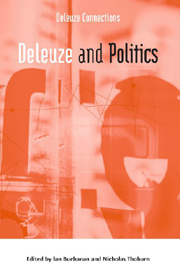Book contents
- Frontmatter
- Contents
- Dedication
- Acknowledgements
- Introduction: Deleuze and Politics
- 1 Power, Theory and Praxis
- 2 Deleuze and the Political Ontology of ‘The Friend’ (philos)
- 3 Molecular Revolutions: The Paradox of Politics in the Work of Gilles Deleuze
- 4 Schizoanalysis, Nomadology, Fascism
- 5 What is a Militant?
- 6 Bourgeois Thermodynamics
- 7 The Age of Cynicism: Deleuze and Guattari on the Production of Subjectivity in Capitalism
- 8 Deleuze, Materialism and Politics
- 9 Becoming-Democratic
- 10 Theorising European Ethnic Politics with Deleuze and Guattari
- 11 People and Fabulation
- 12 Micropolitical Associations
- Notes on Contributors
- Index
7 - The Age of Cynicism: Deleuze and Guattari on the Production of Subjectivity in Capitalism
Published online by Cambridge University Press: 12 September 2012
- Frontmatter
- Contents
- Dedication
- Acknowledgements
- Introduction: Deleuze and Politics
- 1 Power, Theory and Praxis
- 2 Deleuze and the Political Ontology of ‘The Friend’ (philos)
- 3 Molecular Revolutions: The Paradox of Politics in the Work of Gilles Deleuze
- 4 Schizoanalysis, Nomadology, Fascism
- 5 What is a Militant?
- 6 Bourgeois Thermodynamics
- 7 The Age of Cynicism: Deleuze and Guattari on the Production of Subjectivity in Capitalism
- 8 Deleuze, Materialism and Politics
- 9 Becoming-Democratic
- 10 Theorising European Ethnic Politics with Deleuze and Guattari
- 11 People and Fabulation
- 12 Micropolitical Associations
- Notes on Contributors
- Index
Summary
Gilles Deleuze argues that Spinoza's assertion ‘we do not know what a body can do’ functions as a ‘war cry’ cutting through the conceptual divisions of soul, mind and consciousness, defining a new concept of power, philosophy and subjectivity (Deleuze 1990: 255). Deleuze's assertion suggests, albeit obliquely, that works of philosophy can be interpreted through not just their central insight or main points, but their ‘war cry’, the formulation that expresses the battle they wage against other philosophies and conceptions of the world. The ‘war cry’ or slogan (as in mot d'ordre) that could be used to sum up Deleuze and Guattari's two volumes of Capitalism and Schizophrenia is ‘desire belongs to the infrastructure’ (Deleuze and Guattari 1983: 348/416). With this phrase Deleuze and Guattari reject any dualisms or hierarchies, between the mental and the material, subjective and objective or social and libidinal, that would make either the subjective an effect of the material (as in most Marxisms) or the social an effect of the libidinal (as in psychoanalysis). In the first volume, Anti-Oedipus, this assertion is the basis of the polemics against psychoanalysis: for psychoanalysis desire and its anxieties are necessarily mediated through the family, which provides both their cause and condition of intelligibility. This assertion of the immanence of desiring production to social production, or, in the terms of A Thousand Plateaus, machinic assemblages of bodies to collective assemblages of enunciation, persists throughout the two volumes of Capitalism and Schizophrenia, becoming a central philosophical assertion as many of the polemics against psychoanalysis of the first volume are left by the wayside (Deleuze and Guattari 1987: 89/113).
- Type
- Chapter
- Information
- Deleuze and Politics , pp. 139 - 159Publisher: Edinburgh University PressPrint publication year: 2008



